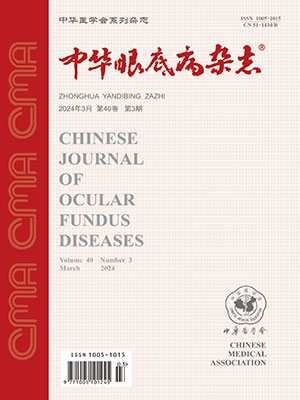| 1. |
中国眼遗传病诊疗小组, 中国眼科遗传联盟. 眼遗传病基因诊断方法专家共识[J]. 中华实验眼科杂志, 2018, 36(7): 481-488. DOI: 10.3760/cma.j.issn.2095-0160.2018.07.001.China Eye Genetic Disease Diagnosis and Treatment Team, China Eye Genetics Alliance. Expert consensus on genetic diagnosis methods for eye genetic diseases[J]. Chin J Exp Ophthalmol, 2018, 36(7): 481-488. DOI: 10.3760/cma.j.issn.2095-0160.2018.07.001.
|
| 2. |
睢瑞芳. 正确解读遗传性视神经病变基因检测结果[J]. 中华眼科杂志, 2021, 57(5): 326-330. DOI: 10.3760/cma.j.cn112142-20200521-00342.Sui RF. Correctly interpret the genetic testing results of inherited optic neuropathy[J]. Chin J Ophthalmol, 2021, 57(5): 326-330. DOI: 10.3760/cma.j.cn112142-20200521-00342.
|
| 3. |
Levy SE, Myers RM. Advancements in next-generation sequencing[J]. Annu Rev Genomics Hum Genet, 2016, 17: 95-115. DOI: 10.1146/annurev-genom-083115-022413.
|
| 4. |
Numa S, Oishi A, Higasa K, et al. EYS is a major gene involved in retinitis pigmentosa in Japan: genetic landscapes revealed by stepwise genetic screening[J/OL]. Sci Rep, 2020, 10(1): 20770[2020-11-27]. https://pubmed.ncbi.nlm.nih.gov/33247286/. DOI: 10.1038/s41598-020-77558-1.
|
| 5. |
Zhu T, Chen DF, Wang L, et al. USH2A variants in Chinese patients with Usher syndrome type Ⅱ and non-syndromic retinitis pigmentosa[J]. Br J Ophthalmol, 2021, 105(5): 694-703. DOI: 10.1136/bjophthalmol-2019-315786.
|
| 6. |
Choi M, Scholl UI, Ji W, et al. Genetic diagnosis by whole exome capture and massively parallel DNA sequencing[J]. Proc Natl Acad Sci USA, 2009, 106(45): 19096-19101. DOI: 10.1073/pnas.0910672106.
|
| 7. |
赵辰, 谢小雷, 冀维真, 等. 美国二代测序技术临床应用的共识声明、实践资源、技术标准和指南的概述[J]. 中华医学遗传学杂志, 2021, 38(6): 513-520. DOI: 10.3760/cma.j.cn511374-20200924-00691.Zhao C, Xie XL, Ji WZ, et al. A review of consensus statements, practice resources, standards and guidelines for clinical applications of next-generation sequencing technologies in the United States[J]. Chin J Med Genet, 2021, 38(6): 513-520. DOI: 10.3760/cma.j.cn511374-20200924-00691.
|
| 8. |
Linoel AC, Costain G, Monfared N, et al. Improved diagnostic yield compared with targeted gene sequencing panels suggests a role for whole-genome sequencing as a first-tier genetic test[J]. Genet Med, 2018, 20(4): 435-443. DOI: 10.1038/gim.2017.119.
|
| 9. |
Lelieveld SH, Spielmann M, Mundlos S, et al. Comparison of exome and genome sequencing technologies for the complete capture of protein-coding regions[J]. Hum Mutat, 2015, 36(8): 815-822. DOI: 10.1002/humu.22813.
|
| 10. |
Zeitz C, Michiels C, Neuille M, et al. Where are the missing gene defects in inherited retinal disorders? Intronic and synonymous variants contribute at least to 4% of CACNA1F-mediated inherited retinal disorders[J]. Hum Mutat, 2019, 40(6): 765-787. DOI: 10.1002/humu.23735.
|
| 11. |
Wu S, Yuan Z, Sun Z, et al. A novel tandem duplication of PRDM13 in a Chinese family with North Carolina macular dystrophy[J/OL]. Graefe's Arch Clin Exp Ophthalmol, 2021 2021:E1[2021-08-24]. https://link.springer.com/article/10.1007%2Fs00417-021-05376-w. DOI: 10.1007/s00417-021-05376-w. [published online ahead of print].
|
| 12. |
Zou X, Yao FX, Li FR, et al. Clinical characterization and the improved molecular diagnosis of autosomal dominant cone-rod dystrophy in patients with SCA7[J]. Mol Vis, 2021, 27: 221-232.
|
| 13. |
Sun Z, Yang L, Li H, et al. Clinical and genetic analysis of the ABCA4 gene associated retinal dystrophy in a large Chinese cohort[J/OL]. Exp Eye Res, 2021, 202: 108389[2020-12-07]. https://pubmed.ncbi.nlm.nih.gov/33301772/. DOI: 10.1016/j.exer.2020.108389.
|
| 14. |
Norman CS, O'Gorman L, Gibson J, et al. Identification of a functionally significant tri-allelic genotype in the Tyrosinase gene (TYR) causing hypomorphic oculocutaneous albinism (OCA1B)[J/OL]. Sci Rep, 2017, 7(1): 4415[2017-06-30]. https://pubmed.ncbi.nlm.nih.gov/28667292/. DOI: 10.1038/s41598-017-04401-5.
|
| 15. |
Grønskov K, Jespersgaard C, Bruun GH, et al. A pathogenic haplotype, common in Europeans, causes autosomal recessive albinism and uncovers missing heritability in OCA1[J]. Sci Rep, 2019, 9(1): 645. DOI: 10.1038/s41598-018-37272-5.
|
| 16. |
Yauy K, Leeuw ND, Yntema HG, et al. Accurate detection of clinically relevant uniparental disomy from exome sequencing data[J]. Genet Med, 2020, 22(4): 803-808. DOI: 10.1038/s41436-019-0704-x.
|
| 17. |
Prado DA, Acosta-Acero M, Maldonado RS. Gene therapy beyond luxturna: a new horizon of the treatment for inherited retinal disease[J]. Curr Opin Ophthalmol, 2020, 31(3): 147-154. DOI: 10.1097/ICU.0000000000000660.
|




